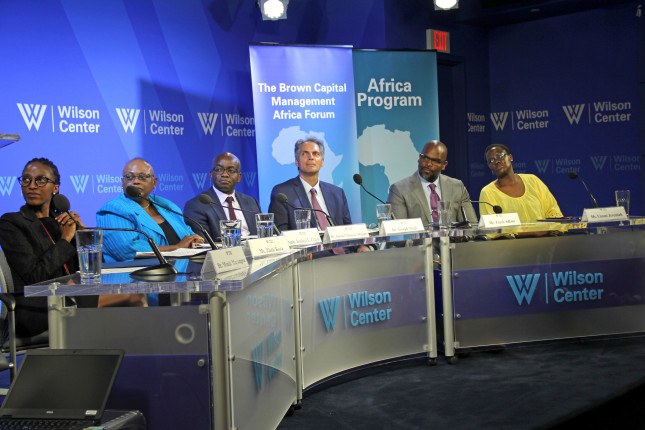-
Transforming Africa: Women and Young People Will Drive Progress
June 18, 2019 By Nazra Amin
“Too often in the United States, the narrative that we hear about Africa is one of poverty, war, and ineffective or failed states. It is a crisis, a place best engaged through aid packages and humanitarian assistance,” said Keith Lee, President and Chief Operating Officer of Brown Capital Management at a recent Wilson Center event hosted by the Africa Program. “This has never been the entire story, and today more than ever, Africa is undergoing enormous transformations that challenge this narrative,” Lee said.
Advancements in Africa
Africa has been portrayed as a continent of slow progress, if not stagnation. However, this is far from the truth. “Africa has the six or seven fastest growing economies in the world,” said Travis Adkins, Lecturer of African and Security Studies at the Walsh School of Foreign Service at Georgetown University. Africa has proven to be the perfect environment for economic growth, a condition likely to continue as “by 2050, Africa will have the largest working population globally,” said Dr. Samuel Munzele Maimbo, Chief Financial Officer of the International Bank for Reconstruction and Development at the World Bank. The continent has also made various advancements in healthcare, including a maternal mortality reduction of more than 60 percent in eight countries, Maimbo said, and a 50 percent reduction in the number of malaria-related deaths overall.
Power of Youth
An important driver of this ongoing transformation of Africa is its youth. The continent is currently undergoing a demographic transformation, resulting in a rise in the population of young people, with “approximately 41 percent of the continent being below the age of 15 years old, and 19 percent between 15 and 24,” said Jendayi E. Frazer, former Assistant Secretary of State for African Affairs and U.S. Ambassador to South Africa. In fact, about 11 million young people are projected to join the labor force each year for the next decade. Although this surplus of young people can be seen as a ticking bomb, in reality, said Frazer, the youth in Africa are agents of change. “They’re pushing for greater accountability of all governing bodies,” she said. “They’re pushing for greater economic inclusion, and I see that energy as being a major driver of change.”
Women Continue to Lead
The role women play in Africa’s transformation cannot be undervalued. From a political perspective, Africa, as a continent, has always set the tone for what women’s participation and leadership looks like, said Unami Jeremiah, Founder of the Mosadi Global Trust. In fact, Rwanda has the world’s highest proportion of seats held by women in national parliament, at 61 percent. For reference, as of June 2018, women made up a global average of 23.8 percent of parliament members. Even with this progress, Africa’s electoral processes still put women who run for political office at a disadvantage, said Jeremiah. If there could be a change in how we structure our elections and who gets to run for political office, she said, that would be a welcome development.
Africa is currently at a critical point in its development as a continent. It is experiencing large transformations across its economic, political, and social spheres, and there are many opportunities for growth and success. To maximize these opportunities, various non-traditional actors should be involved in this process, including women and young people. Additionally, African countries should not just be witnesses to these global and geopolitical changes, said Frazer, they should be agents of change. They should be at the forefront of Africa’s transformation.
Read More:
- Africa’s future workforce: Investing in youth for economic prosperity and equity
- ICPD at 25: How young people are catalysts for change
- Africa in transition: Highlights from a conversation on investing in youth for economic prosperity
Sources: Inter-Parliamentary Union, Population Institute, UN Women, World Bank.
Photo Credit: Wilson Center.
Topics: Africa, development, featured, From the Wilson Center, gender, On the Beat, population, youth
 A Publication of the Stimson Center.
A Publication of the Stimson Center.



